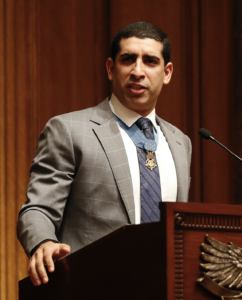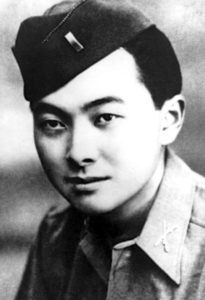Saugus remembers Medal of Honor recipient, WWII vet who died during D-Day
Breanne Kovatch Globe Correspondent, June 6, 2019

On the 75th anniversary of D-Day, Saugus remembered a local World War II hero who died a few days after storming Omaha Beach.
A bell tolled 13 times in front of the Saugus Veterans of Foreign Wars Post 2346 hall at 2 p.m. Thursday: one ring for every man who received the Medal of Honor, the military’s highest honor, for their actions on D-Day, including Army Staff Sergeant Arthur F. DeFranzo, a Saugus native.
“Oh, are you kidding me?” Jack Plunkett, assistant manager of the Saugus VFW post, said when asked whether he could talk about him. “He was a real hero.”
“A lot of these younger kids don’t even know what D-Day is, what these men went through,” said 71-year-old Bill Boomhower, a lifetime member of the post, which is named after DeFranzo. “These guys went through hell in Normandy, they went through hell.”
“Without these men, these American soldiers, where would we be as a country now?” he said.
DeFranzo died in action near Vaubadon, France, on June 10, 1944, according to his Medal of Honor citation. He was 24 and had been in the Army for about four years, according to the Globe archives.
“He went ashore on D-Day at Omaha Beach in Normandy and four days later near Vaubadon, France, scouts from his unit were advancing across an open field when the enemy opened fire with several machine guns and wounded one man,” the Globe reported on June 6, 1984.
DeFranzo went onto the open field to protect the injured scout and was injured while doing so, according to the citation.
He refused medical aid and went back into the field, kept advancing, and was wounded again. He fell about 100 yards from the enemy’s position but continued firing his rifle and encouraging his men forward, according to the citation. He got back up when his men arrived and led them until he was hit yet again.
In his final act, DeFranzo threw several grenades at the enemy’s machine-gun position, destroying the guns but losing his life. According to the citation, his actions “prevented a delay in the assault which would have been of considerable benefit to the foe, and he made possible his company’s advance with a minimum of casualties.”
“The extraordinary heroism and magnificent devotion to duty displayed by SSgt. DeFranzo was a great inspiration to all about him and is in keeping with the highest traditions of the Armed Forces,” the citation states.
The Medal of Honor was presented posthumously to DeFranzo’s mother, Grace, in January 1945, according to a Globe story from Jan. 13 of that year. He was also awarded the Purple Heart and the Silver Star, according to published reports.
“He was a lovable kid, a happy kid. Arthur seemed to get along with everybody,” his sister Ann Walker told the Globe in 1995. “He was one of those persons who would do anything to help anybody.”
Members of the VFW and the community met at the hall and held a ceremony shortly before they rang the hand bell. Similar bell tolling ceremonies were held for Medal of Honor recipients across the country, organized by the National Medal of Honor Museum.



